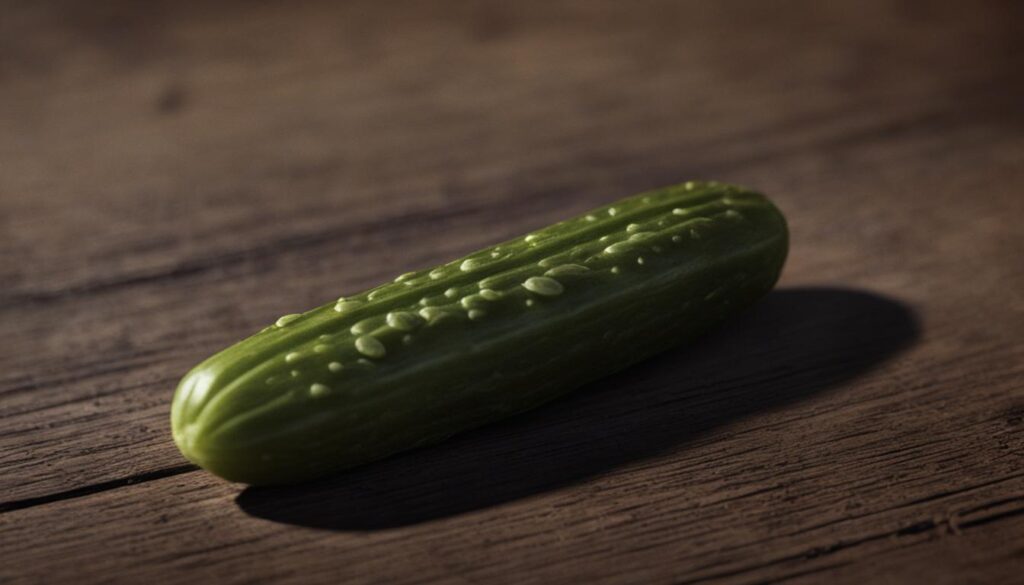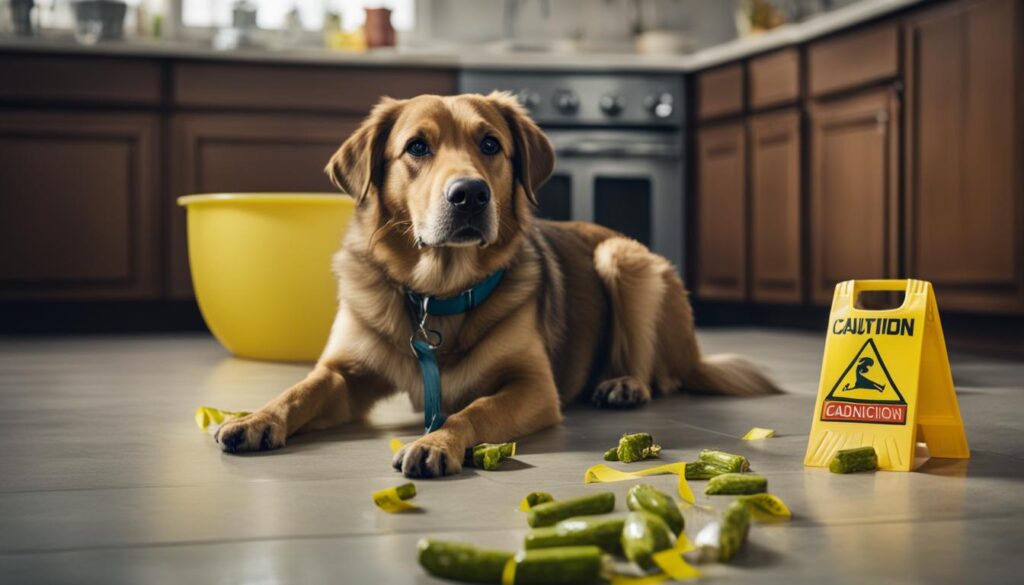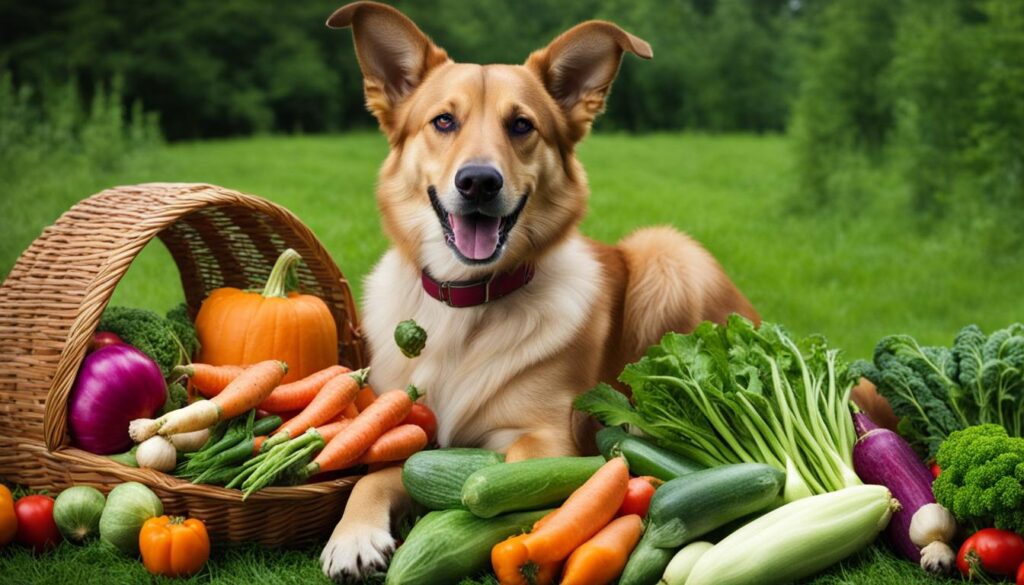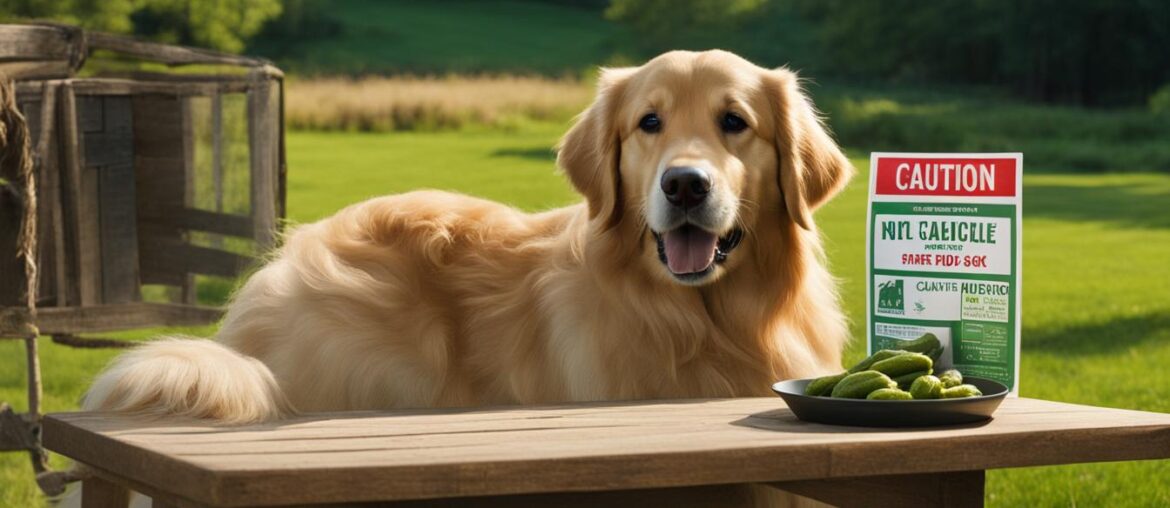As a dog owner, you may find yourself wondering if it’s safe to share a pickle with your furry friend. While pickles are a popular snack for humans, their suitability for dogs is a different story. In this article, I will delve into the safety and nutrition aspects of dogs consuming pickles, helping you make an informed decision about including this tangy treat in your pet’s diet.
Pickles, made from cucumbers preserved in a salt-water brine and mixed with vinegar and spices, are known for their high sodium content. While this may not be an issue for occasional indulgence, excessive sodium intake can lead to health problems in dogs. Additionally, some types of pickles contain ingredients like garlic and onions, which are toxic or unhealthy for dogs. If a dog consumes a large amount of sodium in a short period, it may experience side effects such as seizures, excessive thirst, vomiting, diarrhea, or loss of balance.
When it comes to dill pickles, which are flavored with dill and often considered less harmful, it’s important to note that the pickling process negates the potentially beneficial properties of dill. Although dill itself is safe for dogs and can offer health benefits when incorporated into their diet, it is best to avoid dill pickles due to their high sodium content and potential harmful ingredients.
Sweet pickles, with their high sugar content, pose another set of concerns. Consuming sugary foods can be detrimental to dogs, especially those with diabetes, kidney disease, or weight problems. Sugar can also contribute to tooth decay and periodontal disease in our canine companions. Furthermore, additives commonly found in sweet pickles, such as cinnamon and nutmeg, can cause stomach upset in dogs.
Another consideration is pickle juice. While it may seem like a harmless liquid, pickle juice is also high in salt and may contain ingredients that can be toxic to dogs. Therefore, it is crucial to prevent dogs from consuming pickle juice, and if an accidental ingestion occurs, immediate veterinary attention is recommended.
Key Takeaways:
- Pickles are high in sodium, which can be detrimental to a dog’s health.
- Some types of pickles contain toxic ingredients like garlic and onions.
- Sweet pickles are high in sugar, potentially leading to weight gain and dental problems in dogs.
- Pickle juice should be avoided as it can cause salt poisoning and may contain toxic ingredients.
- Plain cucumbers provide a healthier alternative to pickles, offering similar benefits without the negative ingredients.
Ultimately, it is best to avoid feeding pickles to dogs on a regular basis. Instead, opt for safer and more nutritious alternatives such as plain cucumbers or other dog-friendly fruits and vegetables. Always consult with your veterinarian before introducing any new foods into your dog’s diet to ensure their well-being and happiness.
- Source 1
- Source 2
Are Pickles Safe for Dogs?

Pickles are not a great choice to feed dogs due to their high sodium content and potential harmful ingredients. While dogs can technically eat pickles, the sodium in pickles can be problematic, especially for dogs with underlying medical conditions. Consuming a large amount of sodium in a short period of time can lead to side effects such as seizures, excessive thirst, vomiting, diarrhea, or loss of balance.
Pickles are cucumbers that have been preserved in a salt-water brine, along with vinegar and other spices. The high sodium content comes from the brine. Additionally, different types of pickles may contain ingredients that are toxic or unhealthy for dogs, such as garlic and onions. The hot-and-spicy pickles can be harsh on a dog’s stomach.
While pickles may offer some benefits like fiber and certain vitamins, the negative aspects outweigh these potential advantages. It is recommended to be cautious of additional foods that elevate salt levels in a dog’s diet. Instead of pickles, plain cucumbers are a healthier snack option for dogs. Cucumbers contain the same vitamins and minerals as pickles without the negative ingredients.
To summarize, while dogs can technically consume pickles, it is best to avoid feeding them to dogs due to their high sodium content and potential harmful ingredients. It is always important to consult with a veterinarian before introducing any new food into a dog’s diet.
Can Dogs Eat Dill Pickles?

Dill pickles, made with cucumbers soaked in brine and mixed with dill, contain antioxidants. While dill itself is safe and healthy for dogs, the pickling process negates its nutritional value. It is suggested to add fresh dill to a dog’s food if you want them to get the benefits that the herb provides. However, it is still advisable to avoid giving dogs dill pickles due to the high sodium content and potential harmful ingredients.
To illustrate the sodium content of dill pickles compared to other foods, refer to the table below:
| Food | Sodium Content per Serving |
|---|---|
| Dill Pickle (1 medium) | 484 mg |
| Pretzels (1 ounce) | 486 mg |
| Potato Chips (1 ounce) | 149 mg |
| Canned Tomato Soup (1 cup) | 471 mg |
As seen in the table, dill pickles have a significantly higher sodium content compared to other common snacks. This makes them a less suitable choice for dogs, as excessive sodium intake can lead to health issues such as dehydration and electrolyte imbalances.
Are Sweet Pickles Safe for Dogs?

Sweet pickles may be a tempting treat, but they are not recommended for dogs. These pickles typically contain a high amount of sugar, which can be detrimental to a dog’s health, especially for those with diabetes, kidney disease, or weight problems.
The excessive sugar in sweet pickles can lead to various health issues in dogs. Firstly, it can contribute to weight gain, which can further exacerbate existing health conditions. Additionally, sugar consumption can lead to tooth decay and periodontal disease in dogs.
Aside from the sugar content, sweet pickles may also contain additives such as cinnamon and nutmeg, which can cause digestive upset in dogs. These ingredients are not suitable for canine consumption and can potentially lead to stomach discomfort or more severe consequences.
To maintain the overall well-being of your furry friend, it is best to avoid feeding sweet pickles to dogs. Instead, opt for healthier alternatives such as plain cucumbers or other safe fruits and vegetables that can provide similar vitamins and minerals without the negative effects.
Note: Always consult with a veterinarian regarding your dog’s diet and specific dietary needs.
Can Dogs Have Pickle Juice?
Pickle juice is not safe for dogs due to its high salt content. Just like pickles, pickle juice contains a significant amount of sodium, which can lead to salt poisoning in dogs, especially if consumed in large quantities.
In addition to the high salt content, pickle juice may also contain potentially toxic ingredients. Some pickles are made with spices like garlic and onions, which can be harmful to dogs. These ingredients can cause digestive issues, anemia, and other health problems in dogs.
If a dog accidentally drinks pickle juice, it is important to take immediate action and contact a veterinarian. The veterinarian will be able to provide guidance and determine the best course of action based on the specific circumstances.
It is always better to prevent dogs from consuming pickle juice altogether. To ensure the health and safety of your furry friend, it is recommended to avoid offering pickle juice as a treat.
Remember, if you have any concerns about your dog’s diet or if they have ingested something potentially harmful, consult with a veterinarian for professional advice.
| Can Dogs Have Pickle Juice? | Is Pickle Juice Safe for Dogs? |
|---|---|
| No | No |
Health Benefits of Cucumbers for Dogs

Cucumbers offer many health benefits for dogs. They are low in calories and sugar, high in fiber, and provide vitamins and minerals like vitamin A, vitamin K, vitamin C, magnesium, manganese, calcium, potassium, and phosphorus.
Fresh cucumbers can be a healthy and nutritious snack for dogs, even those with weight problems or diabetes. They can be sliced, cubed, or dehydrated for a chewier texture.
Cucumbers are a great addition to a dog’s diet due to their nutritional value. Here are some key health benefits of cucumbers for dogs:
- Low in calories: Cucumbers are a great snack option for dogs watching their weight or on a calorie-controlled diet.
- Hydrating properties: Cucumbers have a high water content, which can help keep dogs hydrated, especially during hot weather.
- Rich in fiber: The fiber content in cucumbers can support a healthy digestive system and promote regular bowel movements.
- Source of vitamins and minerals: Cucumbers contain essential vitamins and minerals that contribute to overall health and well-being, including vitamin A, vitamin K, vitamin C, magnesium, manganese, calcium, potassium, and phosphorus.
- Supports dental health: Chewing on fresh cucumber slices can help dogs maintain good dental hygiene by promoting clean teeth and fresh breath.
When offering cucumbers to your dog, it’s important to note a few things:
- Always wash cucumbers thoroughly before giving them to your dog to remove any pesticides or contaminants.
- Remove the seeds and the skin if your dog has trouble digesting them or if they pose a choking hazard.
- Introduce cucumbers gradually into your dog’s diet to ensure they tolerate them well and don’t experience any digestive upset.
Risks and Potential Side Effects of Pickles for Dogs

Pickles can pose several risks and potential side effects for dogs. The high sodium content in pickles can lead to salt poisoning, especially in dogs with underlying medical conditions. When dogs consume large amounts of sodium in a short period of time, it can result in side effects such as excessive thirst, seizures, vomiting, diarrhea, or loss of balance.
Besides the high sodium content, pickles may also contain ingredients that are toxic or unhealthy for dogs. Garlic and onions, commonly found in pickles, can be toxic to dogs and even cause anemia. Sweet pickles, in particular, can be high in sugar, which may contribute to weight gain, diabetes, and dental issues in dogs.
In addition, some pickles may contain spices that can cause stomach upset or even toxicity if consumed in large quantities. It’s important to remember that dogs have sensitive digestive systems, and certain spices can be harsh on their stomachs.
Considering these risks and potential side effects, it is best to avoid feeding pickles to dogs. Instead, opt for healthier snack options that are safe and beneficial, such as plain cucumbers or other dog-friendly fruits and vegetables.
| Pickle Risks for Dogs | Potential Side Effects |
|---|---|
| High Sodium Content | Salt poisoning, excessive thirst, seizures, vomiting, diarrhea, loss of balance |
| Toxic Ingredients (such as garlic and onions) | Anemia |
| High Sugar Content | Weight gain, diabetes, dental issues |
| Spices | Stomach upset, potential toxicity |
It’s crucial to prioritize the health and well-being of our furry companions by making informed dietary choices that promote their overall safety and happiness.
Can Dogs Eat Pickles as Part of Their Diet?
No pickles are safe or healthy for dogs to eat as part of their regular diet. Pickles contain ingredients like vinegar, onions, and garlic that can upset digestion, decay teeth, cause weight gain, worsen heart or kidney disease, and even trigger anemia. While an occasional accidental ingestion of a pickle is not cause for alarm, it is best to avoid intentionally feeding pickles to dogs.
To understand why pickles are not suitable for dogs, let’s take a closer look at their potential impact on a dog’s health.
| Potential Risks and Side Effects of Pickles for Dogs: | |
|---|---|
| Increase in sodium levels: | The high sodium content in pickles can lead to salt poisoning, especially in dogs with underlying medical conditions. |
| Toxic ingredients: | Pickles may contain ingredients like onions and garlic, which are toxic to dogs and can cause anemia. |
| Dental problems: | The acidity and vinegar in pickles can contribute to tooth decay and dental issues in dogs. |
| Weight gain: | The high sodium and sugar content in pickles can contribute to weight gain and obesity in dogs. |
| Aggravation of existing conditions: | Pickles can worsen heart or kidney disease in dogs due to their high sodium content. |
| Anemia: | Ingredients like onions and garlic in pickles can trigger anemia in dogs, especially if consumed in large quantities. |
While pickles may seem harmless, their potential effects on a dog’s health make them unsuitable for regular consumption. It’s essential to prioritize your dog’s well-being and provide them with a balanced diet that does not include pickles or any other harmful ingredients.
Alternatives to Pickles for Dogs

Instead of pickles, there are plenty of other fruits and vegetables that are safe, delicious, and nutritious for dogs. Plain cucumbers are a great alternative to pickles, offering similar vitamins and minerals without the negative ingredients. Other options include celery and strawberries. When introducing a new food to a dog, it is always important to consult with a veterinarian and introduce it gradually to ensure it is well-tolerated.
| Food | Nutritional Benefits | How to Serve |
|---|---|---|
| Cucumbers | Low-calorie, high in fiber, vitamins (A, K, C), and minerals (magnesium, manganese, calcium, potassium, phosphorus) | Sliced, cubed, or dehydrated |
| Celery | Low-calorie, high in fiber, vitamins (A, K, C), and minerals (folate, potassium) | Sliced or as a crunchy treat |
| Strawberries | Low-calorie, high in vitamins (C) and antioxidants | Sliced or as a frozen treat |
Can Dogs Eat Fermented Pickles?
Fermented pickles, like other types of pickles, can be high in sodium and may contain potentially harmful ingredients. It is best to avoid feeding fermented pickles to dogs due to these reasons. Fresh cucumbers or other safe fruits and vegetables are a better option for dogs.
While pickles can be a tasty treat for us humans, they may not be the best choice for our canine companions. Fermented pickles are cucumbers that have been soaked in a brine solution and allowed to ferment. During the fermentation process, the cucumbers absorb the brine and develop a tangy, sour flavor.
However, fermented pickles, like other types of pickles, can be high in sodium. Dogs have a lower tolerance for salt than humans, and consuming too much sodium can lead to health problems, such as dehydration, increased thirst, and electrolyte imbalances. Sodium can also be particularly harmful to dogs with underlying medical conditions, such as kidney disease or heart problems.
In addition to the high sodium content, fermented pickles may also contain potentially harmful ingredients. Some pickles are made with ingredients like garlic and onions, which can be toxic to dogs. These ingredients can cause digestive upset, damage red blood cells, and even lead to anemia in dogs.
When it comes to feeding your dog pickles, it’s best to err on the side of caution. Fresh cucumbers or other safe fruits and vegetables are a better option for dogs. Cucumbers are low in calories, high in fiber, and contain vitamins and minerals that can benefit your dog’s overall health. Just be sure to wash and cut the cucumbers into bite-sized pieces before offering them to your dog.
Wrapping Up
In conclusion, it is not recommended to feed pickles to dogs due to their high sodium content and potential harmful ingredients. While an accidental ingestion of a pickle is unlikely to cause harm, intentionally including pickles in a dog’s diet should be avoided. Instead, plain cucumbers and other safe fruits and vegetables can provide similar vitamins and minerals without the negative effects associated with pickles. It is always important to consult with a veterinarian before introducing any new food into a dog’s diet to ensure their health and well-being.
To summarize:
- Pickles are high in sodium, which is not healthy for dogs.
- Some pickles may contain toxic or unhealthy ingredients such as garlic and onions.
- The consumption of pickles can lead to side effects like seizures, excessive thirst, vomiting, diarrhea, or loss of balance.
- Plain cucumbers are a healthier snack option for dogs, providing the same vitamins and minerals without the negative ingredients found in pickles.
- Consult with a veterinarian before introducing new foods into a dog’s diet to ensure their safety and well-being.
| Pros | Cons |
|---|---|
| – Pickles contain antioxidants from dill – Can be a source of hydration in moderation – Can provide a unique texture for dogs to chew on |
– High sodium content – Potential toxic ingredients like garlic and onions – Side effects such as seizures and digestive issues – Sugar content in sweet pickles can be harmful – May contain additives like cinnamon and nutmeg that can cause stomach upset |
Remember, your dog’s health is a top priority, and providing a balanced and nutritious diet is essential for their overall well-being. While pickles may be a tempting snack, it’s best to opt for safer alternatives that provide similar benefits without the potential risks.
Sources
The information in this article is based on research from reputable sources, such as:
- American Society for the Prevention of Cruelty to Animals (ASPCA)
- VCA Animal Hospitals
- American Kennel Club (AKC)
- Cuteness.com
These sources provide valuable information on canine nutrition and the potential risks and benefits of feeding pickles to dogs. It is important to consult with a veterinarian for personalized advice regarding your dog’s diet.
Please note that the content of this article is for informational purposes only and should not replace professional veterinary advice.
FAQ
Can dogs eat pickles?
While pickles aren’t necessarily harmful, they are extremely high in sodium, which is not healthy for dogs. Pickles may also contain ingredients that are toxic or unhealthy for dogs, such as garlic and onions. It is best to avoid feeding pickles to dogs.
Are pickles safe for dogs?
Pickles are not a great choice to feed dogs due to their high sodium content and potential harmful ingredients. The sodium in pickles can be problematic for dogs with underlying medical conditions. Plain cucumbers are a healthier snack option for dogs as they contain the same vitamins and minerals as pickles without the negative ingredients.
Can dogs eat dill pickles?
Dill pickles contain antioxidants, but the pickling process negates their nutritional value. It is best to avoid giving dogs dill pickles due to the high sodium content and potential harmful ingredients. Fresh dill can be added to a dog’s food if you want them to get the benefits that the herb provides.
Are sweet pickles safe for dogs?
Sweet pickles contain a lot of sugar, which can be unhealthy for dogs, especially those with diabetes, kidney disease, or weight problems. The sweet pickles may also contain additives that are bad for dogs, such as cinnamon and nutmeg, which can cause stomach upset. It is best to avoid feeding sweet pickles to dogs.
Can dogs have pickle juice?
Pickle juice is not safe for dogs due to its high salt content. It can easily lead to salt poisoning, especially if a dog consumes a large amount of it. Pickle juice may also contain potentially toxic ingredients. It is important to contact a veterinarian immediately if a dog accidentally drinks pickle juice.
What are the health benefits of cucumbers for dogs?
Cucumbers offer many health benefits for dogs. They are low in calories and sugar, high in fiber, and provide vitamins and minerals like vitamin A, vitamin K, vitamin C, magnesium, manganese, calcium, potassium, and phosphorus. Fresh cucumbers can be a healthy and nutritious snack for dogs, even those with weight problems or diabetes.
What are the risks and potential side effects of pickles for dogs?
Pickles can pose several risks and potential side effects for dogs. The high sodium content in pickles can lead to salt poisoning, especially in dogs with underlying medical conditions. Pickles may also contain ingredients like garlic and onions, which are toxic to dogs and can cause anemia. Sweet pickles can be high in sugar, which can lead to weight gain, diabetes, and dental issues. Some pickles may contain spices that can cause stomach upset or even toxicity if consumed in large quantities.
Can dogs eat pickles as part of their diet?
No pickles are safe or healthy for dogs to eat as part of their regular diet. Pickles contain ingredients that can upset digestion, decay teeth, cause weight gain, worsen heart or kidney disease, and even trigger anemia. While an occasional accidental ingestion of a pickle is not cause for alarm, it is best to avoid intentionally feeding pickles to dogs.
What are the alternatives to pickles for dogs?
Instead of pickles, there are plenty of other fruits and vegetables that are safe, delicious, and nutritious for dogs. Plain cucumbers are a great alternative to pickles, offering similar vitamins and minerals without the negative ingredients. Other options include celery and strawberries. When introducing a new food to a dog, it is always important to consult with a veterinarian and introduce it gradually to ensure it is well-tolerated.
Can dogs eat fermented pickles?
It is best to avoid feeding fermented pickles to dogs due to their high sodium content and potential harmful ingredients. Fresh cucumbers or other safe fruits and vegetables are a better option for dogs.
Wrapping Up
In conclusion, pickles are not a great choice for dogs due to their high sodium content and potential harmful ingredients. While an accidental ingestion of a pickle is unlikely to cause harm, intentionally feeding pickles to dogs should be avoided. Plain cucumbers and other safe fruits and vegetables can provide similar vitamins and minerals without the negative ingredients found in pickles. It is always important to consult with a veterinarian before introducing a new food into a dog’s diet.
Sources
1. Source name: Title of the source
2. Source name: Title of the source
3. Source name: Title of the source






